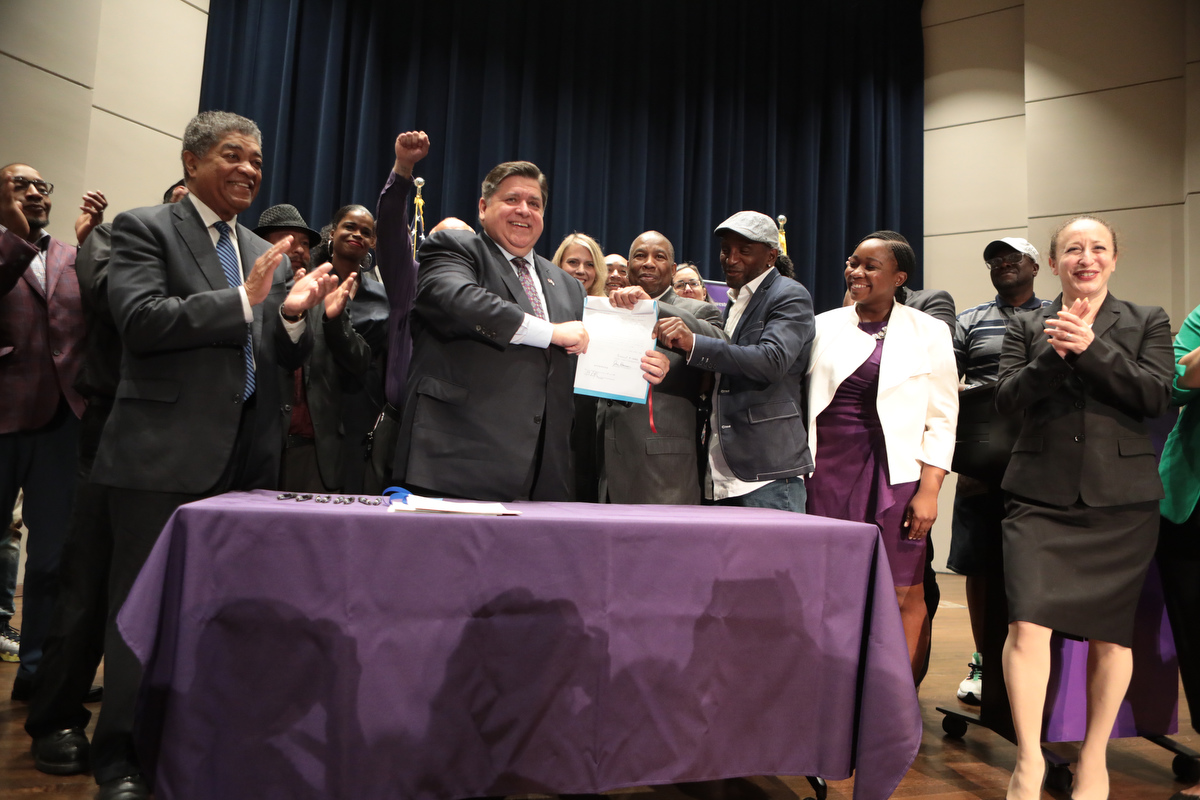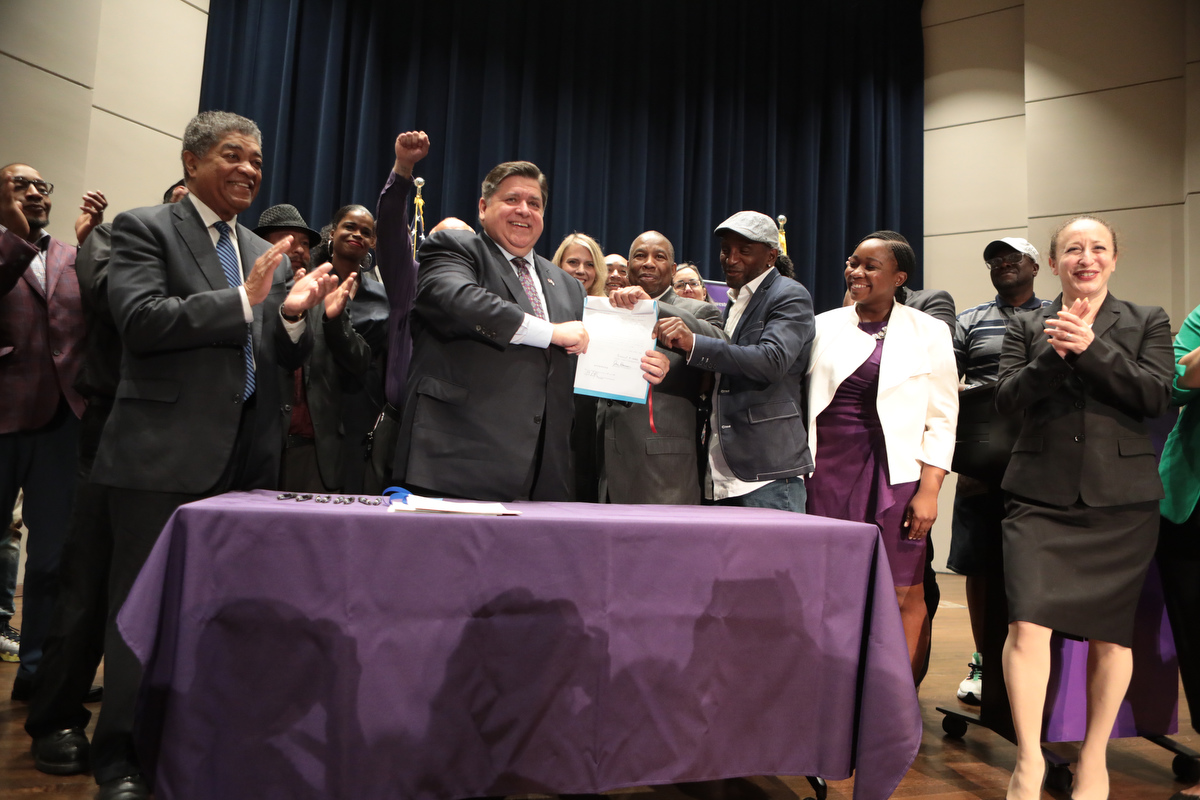Illinois Becomes the First State to Ban Police from Lying to Juveniles During Interrogations
Governor Pritzker signs historic bill prohibiting police from using deception during interrogations of minors.
07.15.21 By Innocence Staff
(Chicago, IL — July 15, 2021) Today, Governor JB Pritzker signed historic legislation into law at a ceremonial bill signing, making Illinois the first state in the country to prohibit law enforcement officers from using deception while interrogating people under the age of 18. The new law bans commonly used deceptive interrogation tactics, including making false promises of leniency and false claims about the existence of incriminating evidence. Both of these tactics have long been identified as significantly increasing the risk of false confessions, which have played a role in about 30% of all wrongful convictions overturned by DNA. False confessions are also the most frequent contributing factor in wrongful conviction cases involving homicides. And recent studies suggest that children under 18 are between two and three times more likely to falsely confess than adults.
The ceremony was held at Northwestern University Pritzker School of Law’s Thorne Auditorium. Governor Pritzker was joined by wrongfully convicted individuals, many of whom had falsely confessed as a result of police deception and coercion. Cook County State Attorney Kim Foxx, bill sponsors State Senator Robert Peters (D-13th District) and State Representative Justin Slaughter (D-27th District), as well as representatives from the Innocence Project, the Center on Wrongful Convictions, and the Illinois Innocence Project were also in attendance for the landmark bill signing.
This law is rooted in the work and expertise of the Innocence Project, the Illinois Innocence Project, the Office of Cook County State’s Attorney Kim Foxx, and the Center on Wrongful Convictions at Northwestern University School of Law, which collectively have exposed hundreds of wrongful convictions based on false confessions. The legislation garnered support from law enforcement organizations including the Illinois Chiefs of Police, and the Illinois State’s Attorney Association. It is because of this powerful coalition that the bill passed the Illinois General Assembly with near-unanimous bipartisan support.
“Today is a historic day, reflecting how far the Innocence Project’s initial foray into false confession reform has come — from mandating the electronic recording of interrogations, a foundational change that makes a record of what transpires in the interrogation room. Now that more than half the states have implemented this reform, we have also turned our attention to interrogation methods employed by law enforcement,” said Rebecca Brown, director of policy at the Innocence Project. “This law is a breakthrough in safeguarding against the wrongful convictions of young people, and an opportunity to establish interrogation techniques that stem from seeking truth and justice within law enforcement agencies across the country.”
Senator Peters’s sponsorship of this legislation builds upon reforms originally pursued in 2003 by President Barack Obama (who previously represented the same district), when then-Senator Obama sponsored an Illinois law requiring the recording of interrogations. “Chicago is the wrongful conviction capital of the nation, and a disproportionate number of wrongful convictions were elicited from Black youth by police who were allowed to lie to them during questioning,” said Senator Peters. “That ends now. It’s time to restore real safety and real justice to our communities and end practices that perpetuate trauma and put the wrong people in prison.”
The new law follows recommendations made by the International Association of Chiefs of Police and global police training organizations, including leading firm Wicklander-Zulawski & Associates, Inc. It previously passed the Illinois Assembly with widespread support, passing the Senate 47-1 and the House 114-0.
“The history of false confessions in Illinois can never be erased, but this law is a critical step to ensuring that history is never repeated,” said Cook County State’s Attorney Kim Foxx. “I hope this is a start to rebuilding confidence and trust in a system that has done harm to so many people for far too long. I commend Senator Peters, Representative Slaughter, and an incredible coalition of advocates and law enforcement for championing this bill in the interest of justice.”
“I have spent my career representing children and teenagers who falsely confessed to crimes they didn’t commit, including 16-year-old Brendan Dassey, whose story was told in the Netflix series Making a Murderer,” said Laura Nirider, co-director of the Center on Wrongful Convictions at Northwestern University Pritzker School of Law, who consulted as an expert on the bill. “This law is the first of its kind in the country that is directly targeted at reducing the likelihood of future false confessions, so that we don’t have more Brendan Dasseys. I’m proud that Illinois has shown such leadership in passing this historic reform.”
“In Illinois alone, there have been 100 wrongful convictions predicated on false confessions, including 31 involving people under 18 years of age,” said Lauren Kaeseberg, legal director at the Illinois Innocence Project based at the University of Illinois Springfield. “Today, we have taken a critical step in changing the trajectory of false confessions and the subsequent wrongful convictions that we have seen as a result of deceptive interrogation tactics. Our state has been known for too long as the ‘false confession capital of the country,’ and we are proud to see Illinois take a leading role in reforming this outdated practice.”


Leave a Reply
Thank you for visiting us. You can learn more about how we consider cases here. Please avoid sharing any personal information in the comments below and join us in making this a hate-speech free and safe space for everyone.